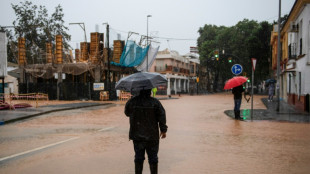
-
 Van Nistelrooy says he will 'cherish' Man Utd memories in farewell message
Van Nistelrooy says he will 'cherish' Man Utd memories in farewell message
-
IAEA chief tours sensitive Iran nuclear plants

-
 Pompeii rejects 'mass tourism' with daily visitor limit
Pompeii rejects 'mass tourism' with daily visitor limit
-
Jailed Russian poet could be 'killed' in prison, warns wife

-
 French court orders release of Lebanese militant held since 1984
French court orders release of Lebanese militant held since 1984
-
Global stocks struggle after Fed signals slower rate cuts

-
 UK economy slows, hitting government growth plans
UK economy slows, hitting government growth plans
-
Primary schools empty as smog persists in Indian capital
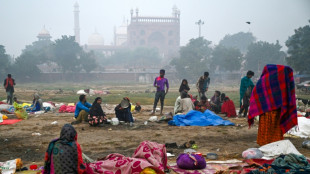
-
 Palestinians turn to local soda in boycott of Israel-linked goods
Palestinians turn to local soda in boycott of Israel-linked goods
-
Typhoon Man-yi bears down on Philippines still reeling from Usagi

-
 UK growth slows in third quarter, dealing blow to Labour government
UK growth slows in third quarter, dealing blow to Labour government
-
Chris Wood hits quickfire double in NZ World Cup qualifying romp

-
 Markets struggle at end of tough week
Markets struggle at end of tough week
-
China tests building Moon base with lunar soil bricks

-
 Film's 'search for Palestine' takes centre stage at Cairo festival
Film's 'search for Palestine' takes centre stage at Cairo festival
-
Oil execs work COP29 as NGOs slam lobbyist presence
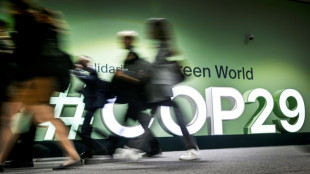
-
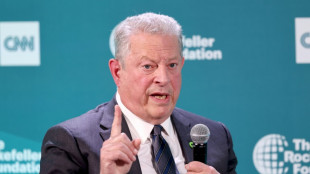 Gore says climate progress 'won't slow much' because of Trump
Gore says climate progress 'won't slow much' because of Trump
-
'Megaquake' warning hits Japan's growth

-
 Stiff business: Berlin startup will freeze your corpse for monthly fee
Stiff business: Berlin startup will freeze your corpse for monthly fee
-
Wars, looming Trump reign set to dominate G20 summit

-
 Xi, Biden attend Asia-Pacific summit, prepare to meet
Xi, Biden attend Asia-Pacific summit, prepare to meet
-
Kyrgios to make competitive return at Brisbane next month after injuries

-
 Dominican Juan Luis Guerra triumphs at 25th annual Latin Grammys
Dominican Juan Luis Guerra triumphs at 25th annual Latin Grammys
-
Landslide win for Sri Lanka president's leftist coalition in snap polls

-
 Australian World Cup penalty hero Vine takes mental health break
Australian World Cup penalty hero Vine takes mental health break
-
As Philippines picks up from Usagi, a fresh storm bears down

-
 Tropical Storm Sara pounds Honduras with heavy rain
Tropical Storm Sara pounds Honduras with heavy rain
-
Pepi gives Pochettino win for USA in Jamaica

-
 'Hell to heaven' as China reignite World Cup hopes with late winner
'Hell to heaven' as China reignite World Cup hopes with late winner
-
Rebel attacks keep Indian-run Kashmir on the boil

-
 New Zealand challenge 'immense but fantastic' for France
New Zealand challenge 'immense but fantastic' for France
-
Under pressure England boss Borthwick in Springboks' spotlight

-
 All Blacks plan to nullify 'freakish' Dupont, says Lienert-Brown
All Blacks plan to nullify 'freakish' Dupont, says Lienert-Brown
-
TikTok makes AI driven ad tool available globally

-
 Japan growth slows as new PM readies stimulus
Japan growth slows as new PM readies stimulus
-
China retail sales pick up speed, beat forecasts in October

-
 Asian markets fluctuate at end of tough week
Asian markets fluctuate at end of tough week
-
Gay, trans people voicing -- and sometimes screaming -- Trump concerns

-
 Argentina fall in Paraguay, Brazil held in Venezuela
Argentina fall in Paraguay, Brazil held in Venezuela
-
N. Korean leader orders 'mass production' of attack drones

-
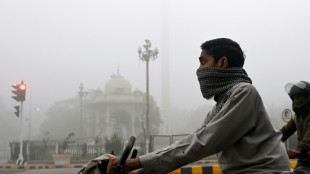 Pakistan's policies hazy as it fights smog
Pakistan's policies hazy as it fights smog
-
Nature pays price for war in Israel's north

-
 New Zealand's prolific Williamson back for England Test series
New Zealand's prolific Williamson back for England Test series
-
Mexico City youth grapple with growing housing crisis

-
 After Trump's victory, US election falsehoods shift left
After Trump's victory, US election falsehoods shift left
-
Cracks deepen in Canada's pro-immigration 'consensus'

-
 Xi inaugurates South America's first Chinese-funded port in Peru
Xi inaugurates South America's first Chinese-funded port in Peru
-
Tyson slaps Paul in final face-off before Netflix bout

-
 England wrap-up T20 series win over West Indies
England wrap-up T20 series win over West Indies
-
Stewards intervene to stop Israel, France football fans clash at Paris match

| CMSD | -0.02% | 24.725 | $ | |
| CMSC | -0.24% | 24.55 | $ | |
| SCS | -0.75% | 13.27 | $ | |
| RBGPF | 100% | 61.84 | $ | |
| GSK | -2.09% | 34.39 | $ | |
| BCC | -1.57% | 140.35 | $ | |
| NGG | 0.4% | 62.37 | $ | |
| AZN | -0.38% | 65.04 | $ | |
| BTI | 0.2% | 35.49 | $ | |
| RIO | -0.31% | 60.43 | $ | |
| BP | 1.65% | 29.05 | $ | |
| JRI | -0.23% | 13.21 | $ | |
| RYCEF | -4.71% | 6.79 | $ | |
| BCE | -1.38% | 26.84 | $ | |
| RELX | -0.37% | 45.95 | $ | |
| VOD | -0.81% | 8.68 | $ |

Three positive climate developments
While humanity's efforts to curb planet-warming emissions are nowhere near enough to avoid heating the world to catastrophic levels, tentative improvements show that progress is possible.
The climate trajectory, while still poor, has improved since countries signed the Paris Agreement in 2015 and committed to limiting the global temperature rise to "well below" two degrees Celsius above pre-industrial levels, preferably a safer 1.5C.
And the uptake of renewable energy is providing a rare glimmer of hope.
- Heating -
When the Paris Agreement was adopted, the global reliance on fossil fuels -- oil, gas and coal -- placed the world on a path towards a 3.5C rise in temperature by 2100 compared to the pre-industrial era, the International Energy Agency (IEA) said at the time.
Warming of that scale would prompt catastrophic climate disasters worldwide, including the risk of mass extinctions, the melting of glaciers and permafrost that could eventually unleash metres of sea level rise and unliveable conditions across much of the planet.
Eight years on, country commitments to reduce their carbon footprints have pulled that down slightly, putting the world on a path for a still-disastrous 2.5C to 2.9C by the end of the century, according to the UN's Environment Programme this month.
Every tenth of a degree of warming compounds the negative impacts on the climate, but the modest temperature reduction "reflects progress made in the transition to a lower emissions energy system since 2015", said the IEA.
But it "still falls far short of what is needed", the agency added.
- Peak emissions -
Annual greenhouse gas emissions responsible for climate change have risen roughly nine percent since COP21, according to UN data.
That increase led to record-breaking concentrations of CO2, methane (CH4) and nitrous oxide (N2O) in the atmosphere in 2022, the World Meteorological Organization said last week.
But the rate of the increase has slowed significantly.
The climate experts of the UN Intergovernmental Panel on Climate Change (IPCC) have projected that to meet the Paris goals, emissions need to peak by 2025.
To limit temperature rise to 1.5C emissions need to be slashed almost in half by 2030.
Recent estimates by the Climate Analytics institute find global emissions could peak by 2024 or even as early as this year.
The IEA in its pre-Paris deal assessment predicted that carbon dioxide emissions tied to the energy sector -- responsible for more than 80 percent of CO2 emitted by human activity -- could reach 43 gigatonnes (Gt) in 2030.
But the agency now says that current efforts mean that figure will be 35Gt by 2030.
That difference was "equal to the current combined energy sector emissions of the United States and European Union", it said.
- Rising renewables -
Three technologies -- solar, wind and electric vehicles -- are largely behind the improved global warming estimates since 2015.
"Solar PV is projected to reduce emissions by around three Gt in 2030," the OCED now estimates, "roughly equivalent to the emissions from all the world's cars on the road today."
Wind power is expected to reduce emissions by two gigatonnes in 2030 and electric vehicles (EVs) by around one gigatonne, compared to pre-Paris Agreement scenarios.
Photovoltaics (PVs) and wind power are expected to represent around 15 percent of global electricity production in 2030 - seven times the wind power and three times the PVs that the IEA predicted in 2015.
At the time, fleets of electric vehicles seemed a pipedream. The IEA anticipated that EVs would account for less than two percent of car sales by 2030.
It now estimates that more than a third will be purchases of electric vehicles by the end of the decade.
And the numbers are accelerating. "Clean energy technology adoption surged at an unprecedented pace over the last two years," said the IEA, noting a 50-percent increase in solar PV capacity and a 240-percent rise in EV sales.
The IEA attributes the progress -- unthinkable before the Paris Agreement -- to declining costs and public policy initiatives from China, the United States and Europe among others.
Five-year plans in China have raised ambitions for solar power and driven down global costs.
Off-shore wind projects in Europe "kick-started a global industry" and electric two-wheelers and buses "have seen significant uptake in India and other emerging markets", said the agency.
C.Kovalenko--BTB

